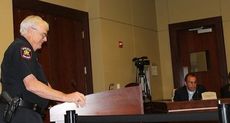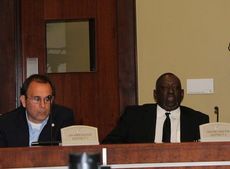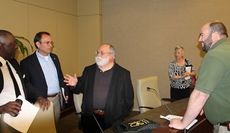
Jim Fair
Police Chief Dan Reynolds enjoys a lighter moment during Tuesday's City Council meeting that discussed an ordinance on distracted driving. It passed 4-3 and moves to a public forum and second reading on April 22 at 6:30 p.m.

Jim Fair
Councilmen Jay Arrowood, left, and Wayne Griffin voted opposite – Arrowood against, Griffin for – a distracted driving ban.

Jim Fair
Discussion on a distracted driving ordinance went long into the night Tuesday at the City Council meeting. Left to right: Councilmen Wayne Griffin, Jay Arrowood, Wryley Bettis and councilwoman Judy Albert, who asked for the ordinance. Jackie Batson, right, spoke in the public forum.
The lines were clearly defined at the council meeting with Mayor Rick Danner casting the tie-breaking vote to approve the ordinance as written to move it forward for a public forum and second reading on April 22.
Jay Arrowood (District 1), Lee Dumas (District 4) and Wryley Bettis (District 5) voted against the proposed ordinance and Judy Albert (District 6), who asked for the city to draft the ordinance, Wayne Griffin (District 2) and Kimberly Bookert (District 3) voted yes. Griffin said he reluctantly voted yes.
The two hot-button issues were the definition of voice-operated technology and enforcement of the ordinance. Danner said simply enforcement is up to the city administrator and departments.
The controversial exception to provisions, had council and city staff agreeing that Exception: 4 will be stricken or modified before second reading. Not applicable, according to the ordinance, is “The use of voice-operated technology while the device is being used for telephonic communication provided the driver is not holding the device while driving.”
“Does that include talking on the phone?” Arrowood asked. Dumas commented that it appeared to refer to “voice operated technology that hasn’t been utilized and people can’t afford it.”
Mike Self, assistant city administrator, said, “There was some residual language left over (in the draft) and it should be removed to make it clearer.”
A post on the City of Greer website Wednesday by an apparent staffer targeted the individual who added the phrase some council members suggested was confusing.
The post read: “That exception was added to the proposed ordinance by the city attorney and will likely be struck.” The post, consisting of a dialogue between the apparent city staffer and individual on the proposed ordinance, was later taken down Wednesday.
Greer’s proposed ordinance is virtually the same as the one the City of Clemson adopted in 2010, the first of its kind in South Carolina. In fact, changing Clemson's wording of its ordinance to give the appearance of an original may have contributed to some of the confusion.
A large part of council’s discussion included Greer Police Chief Dan Reynolds answering questions how the ordinance would likely be enforced and the legalities of confiscating the hand-held devices from drivers suspected of texting while operating a moving vehicle. “You can’t confiscate a cell phone without a subpoena and specifically stating your purpose,” Reynolds said.
Bettis said, “There is very little you could bring to me that would get me to vote for banning any kind of electronics in a vehicle. You’ve got to draw the line somewhere. Let’s do it with education. Put up signs or messages to educate drivers.”
Reynolds responded that the city’s “Alive at 25” and SIDNE (Simulated Impaired Driving Experience) are two successful educational programs shared at schools and youth organizations. The programs earned the GPD the 2012 Municipal Association of South Carolina Achievement Award for Public Safety.
“It’s (distracted driving) kind of a trendy issue,” Bettis said. “I would like to see the (city) statistics on the number of deaths caused by cell phone or texting while driving.” The city doesn’t keep statistics on distracted driving except for driving under the influence of alcohol or drugs.
The National Highway Traffic Safety Administration (NHTSA), reported it estimates that 3,328 people were killed and an estimated 421,000 were injured in distraction-related crashes in 2012. That’s an average of nine deaths a day.
Arrowood asked Reynolds how an officer could determine if a driver was talking on the cell phone versus texting and if his department could make a judgment for a distracted driving stop with visual observance.
“An officer has to witness someone texting,” said Arrowood. “What is the definition of texting? What if someone is dialing a phone number and it appears it could be texting?”
Reynolds shrugged his shoulders, said he didn’t think he could make that determination with the proposed ordinance and it would be difficult to observe whether the driver was dialing a phone or texting.
Albert referred to a Virginia Tech Transportation Institute 2009 study on cell phones and distracted driving. “The study said text messaging increased the risk of a crash or near-crash 23 times more than a driver who wasn’t distracted.
Albert said two other findings were clear to her distracted driving needs an enforceable ordinance in Greer.
• Text messaging, browsing, and dialing resulted in the longest duration of drivers taking their eyes off the road.
• Activities performed when completing a call — reaching for a phone, looking up a contact, and dialing the number — increased risk by three times.
Jackie Batson spoke against the proposed ordinance in the public forum. Batson and Arrowood asked why public officials were being excluded from the ordinance. “There is no law governing that, police have their own laws,” Arrowood said.
Reynolds said his officers have a department policy against using personal electronic devices while on duty. “We teach our officers not to look at or use the electronic terminals while operating a vehicle,” Reynolds said.
Bettis asked for clarification what constituted electronic media in the distracted ordinance.
“The state should come up with some common standards for everybody,” Dumas said. “I don’t think this has been out there long enough for us to adopt.”
Danner had to bring the discussion to order twice when council members were engaged in multiple conversations but the entire session, although passionate from both sides of the issue, did not take on a boisterous or personal overtone.